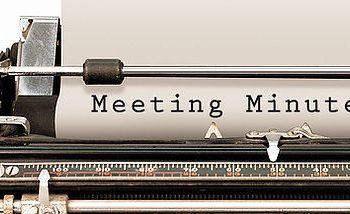 August 2019
August 2019
Meetings are at the core of how condo corporations operate. Condo board meetings are a legal requirement for decision making. Committees meet regularly to deal with whatever aspect of condo living they are tasked with. Town hall meetings are periodically convened for residents to meet with the board. Then there are less formal conversations where condominium managers meet with residents, directors, employees and contractors on a daily basis.

Meeting topics are determined by an agenda typically provided to all attendees. Meeting minutes are the written record of a meeting.
Meetings can be structured for efficiency, productivity and decision making. They can also be unproductive and a waste of time. It depends on how they are managed. Efficient and well run meetings leave more time for doing the work of condo management.
One of the biggest impediments to productive meetings is participants controlling the agenda, bringing up off-topic items and interrupting others. Once meetings degenerate in this way they become unproductive and overly long.
Utilize an agenda to make participants aware of what is to be discussed at the meeting
Utilize an agenda to make participants aware of what is to be discussed at the meeting. Begin the meeting by stating “We have a full agenda today – Non agenda items will be covered at a future meeting” to signal the intent of having a productive meeting. Periodic reference to the agenda keeps everyone focused. When an agenda does not exist, it can be created by the group before topics are discussed.
When discussion of a topic gets heated, the situation can be defused by a participant suggesting the topic be tabled for a later date. This allows tempers to calm and allows for a more meaningful discussion at the next meeting. More importantly, this signals to attendees that discussions and debates are to be conducted respectfully and rationally.
Going off-topic, or off-agenda, should be discouraged
Going off-topic, or off-agenda, should be discouraged. When individuals begin discussing a non-agenda topic, suggesting the conversation occur “offline” is a respectful way of getting back to the agenda. If the topic is relevant, it can be added to the agenda for the next meeting.
To balance the opinions of more vocal attendees, call on less involved attendees by name for their opinions.
Town Hall or Resident Meetings
Meetings involving residents or owners, including board meetings where residents are in attendance, can be the most difficult to manage when they become a forum for dissatisfaction. Arguments and insults among attendees are distasteful to the majority in attendance and a waste of time. Allowing meetings to go off-topic or devolve is a sign of poor management. Keeping these meetings civil and on-track is necessary or owners will choose not to attend future meetings.
Establish meeting rules at the onset
One way to avoid these problems is to establish meeting rules at the onset. This can be done by distributing a notice to all before the meeting commences.
As an introduction this notice can state “Residents are encouraged to attend this meeting. If you would like to bring an issue to the board’s attention, you’re welcome to speak when called on. So that everyone has an opportunity to participate, we ask that you observe the following guidelines”.
Guideline can include the following:
- This is a meeting of neighbors. Please act in a civil, professional and neighbourly manner.
- If you’d like to address the group, please sign in when you arrive. You will be called on at the appropriate time. This will also allow us to contact you if your concern is something not appropriate for this forum.
- This meeting is not a complaint session. If you have a concern that is not part of the agenda or which relates solely to your suite, we will contact you privately to discuss. If the problem you discuss with the group is of a more general nature, we would like to hear your suggestions for a solution.
- Please refrain from speaking if particularly upset about an issue. Speak privately with a board member or management, or put your concerns in writing for the board to consider.
- Only one person may speak at a time. Respect other opinions by remaining seated and silent when someone else has the floor.
- When speaking, your time is limited to three minutes. Limiting your remarks will allow more time to address your concerns and those of others. If you require more time, please put your comments in writing and include specifics.
- Matters requiring board deliberation or consideration will not be discussed. Once discussed at a board meeting, and voted on if appropriate, we will provide you with a response.









